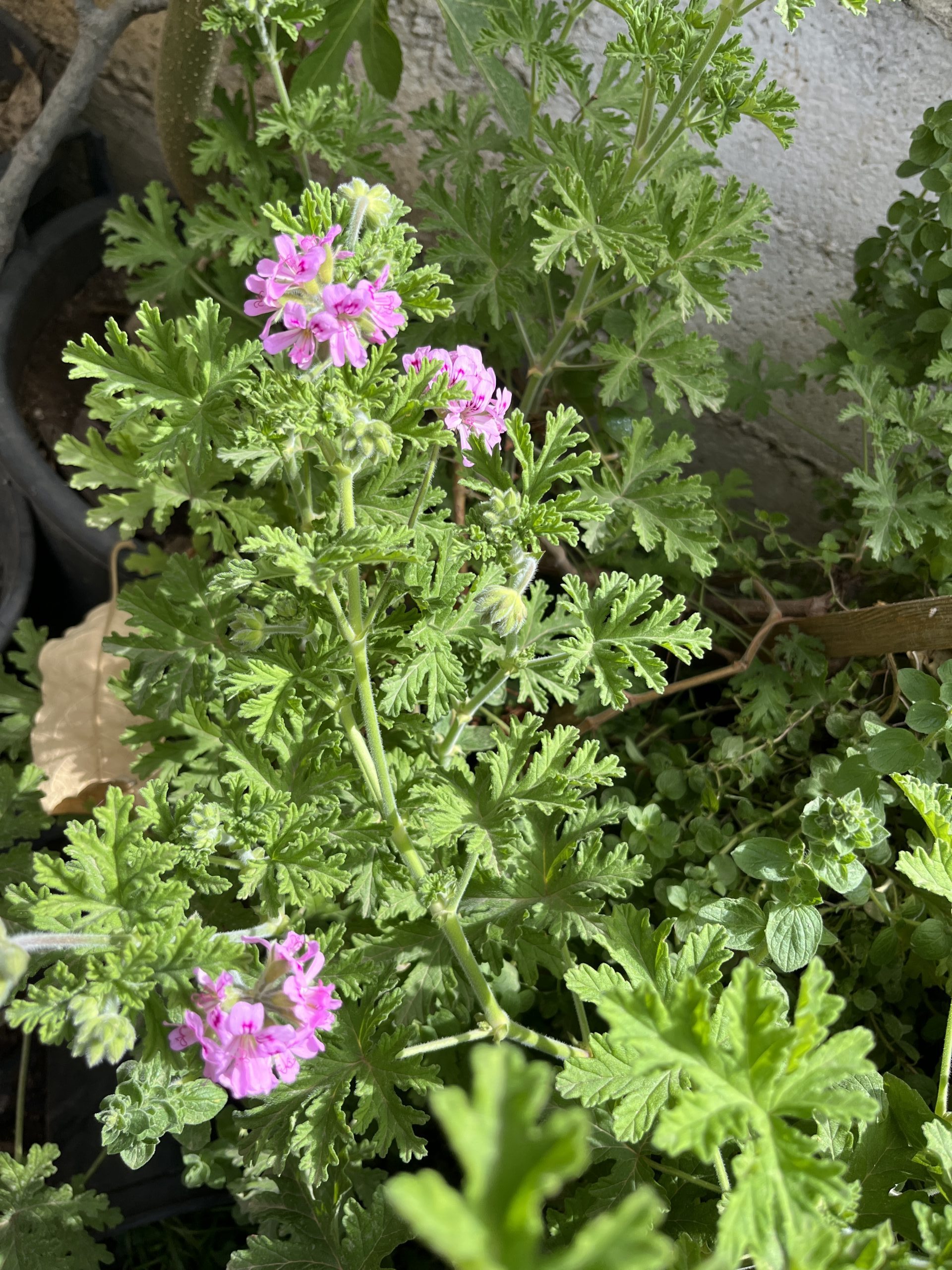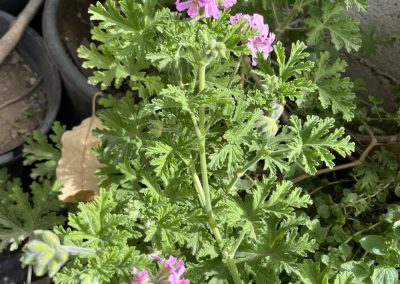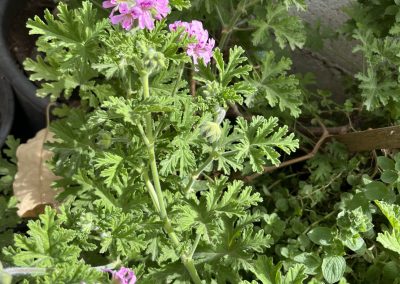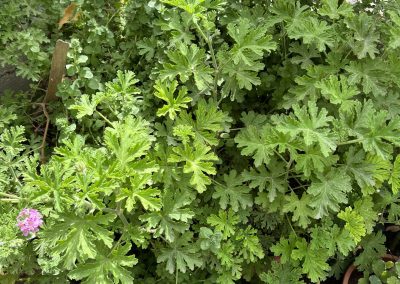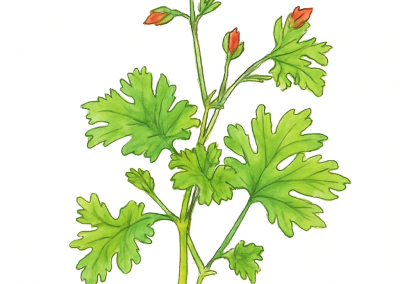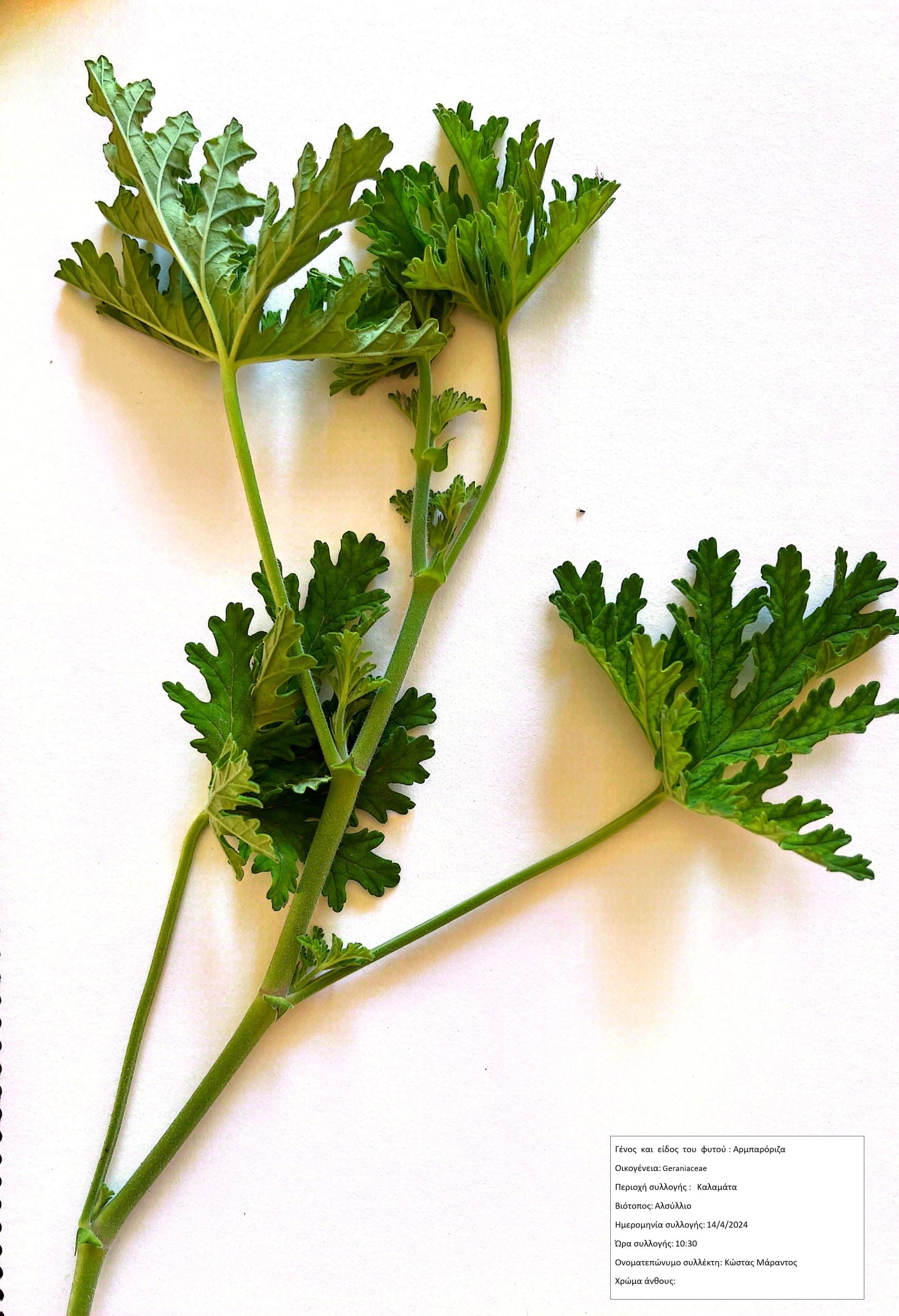Pelargonium graveolens
Scientific description
Scientific name: Pelargonium graveolens
Kingdom: Plantae | Clade: Angiosperms, Magnoliophyta | Class: Magnoliopsida | Suborder: Rosidae | Order: Geraniales | Family: Geraniaceae | Genus: Pelargonium | Species: P. graveolens
Greek synonyms: albaroriza, arbaroriza; pelargonium; Lesbos: chrysalis; Cyprus: kiouli; Western Macedonia: moschophyllos; parts of Macedonia: miscitsecek (“flower that smells good”).
Origin: South Africa.
Description: Perennial herbaceous plant with tender non-woody stems. Fast-growing. Leaves grey-green, serrated, fuzzy, large, strongly aromatic when rubbed. Flowers in umbel-type inflorescences with 5 petals, pink to purple shades.
Propagation: Best by cuttings in any growing season. Prefers sunny or semi-shaded locations. Light, sandy soil with excellent drainage. Roots intolerant of excessive moisture. Can grow in poor soils.
Ecology: In Greece mainly coastal areas with mild winters; grown as annual in mountains and protected in winter. Tolerates even severe pruning to maintain compact form. Best pruned in early spring.
Uses: Culinary: liqueurs with alcohol and sugar; flavor modifier in jams and spoon sweets. Medicinal: aromatic herb. Aromatic/household: lemon-like aroma similar to citronella; strong scent repels pests (mosquitoes).
Pelargonium graveolens (ελληνική κοινή ονομασία: Αρμπαρόριζα)
Βασίλειο: Φυτά | Συνομοταξία: Αγγειόσπερμα (Magnoliophyta) | Ομοταξία: Δικοτυλήδονα (Magnoliopsida) | Υπομοταξία: Ροδίδες | Τάξη: Γερανιώδη (Geraniales) | Οικογένεια: Γερανιοειδή (Geraniaceae) | Γένος: Πελαργόνιον | Είδος: P. graveolens
Ελληνικά συνώνυμα: αλμπαρόριζα, αρμπαρόριζα; πελαργόνι; Λέσβος: χρυσαχί; Κύπρος: κιούλι; Δυτική Μακεδονία: μοσχόφυλλο; σε άλλες περιοχές Μακεδονίας: μιστσιτσέκ («λουλούδι που μυρίζει ωραία»).
Καταγωγή: Νότια Αφρική.
Περιγραφή: Πολυετές ποώδες φυτό με τρυφερούς μη ξυλώδεις βλαστούς, ταχύτατη ανάπτυξη. Φύλλα γκριζοπράσινα, οδοντωτά, χνουδωτά, μεγάλα, έντονη αρωματική ευωδιά όταν τρίβονται. Άνθη σε ταξιανθίες τύπου σκιαδίου, 5 πέταλα, αποχρώσεις ροζ-μωβ.
Πολλαπλασιασμός: Με μοσχεύματα βλαστών όλες τις εποχές. Προτιμά ηλιόλουστα ή ημισκιερά μέρη. Ελαφρύ, αμμώδες έδαφος με καλή αποστράγγιση. Οι ρίζες δεν ανέχονται υπερβολική υγρασία. Ανθεκτικό σε φτωχά εδάφη.
Οικολογία: Στην Ελλάδα: κυρίως παράκτιες περιοχές, ορεινά ως ετήσιο προστατευόμενο. Αντέχει αυστηρό κλάδεμα για συμπαγή μορφή. Καλύτερη εποχή: αρχές άνοιξης.
Χρήσεις: Παρασκευή λικέρ με αλκοόλ και ζάχαρη. Τροποποιητικό γεύσης σε μαρμελάδες/γλυκά κουταλιού. Αρωματικό βότανο με έντονο άρωμα λεμονιού/λεμονανθού και απωθητική δράση σε έντομα, π.χ. κουνούπια.
Pelargonium graveolens
Règne: Plantae | Clade: Angiospermes, Magnoliophyta | Classe: Magnoliopsida | Sous-ordre: Rosidae | Ordre: Geraniales | Famille: Geraniaceae | Genre: Pelargonium | Espèce: P. graveolens
Synonymes grecs: albaroriza, arbaroriza; pelargonium; Lesbos: chrysalide; Chypre: kiouli; Macédoine occidentale: moschophyllos; autres régions Macédoine: miscitsecek (“fleur qui sent bon”).
Origine: Afrique du Sud.
Description: Plante herbacée vivace, tiges tendres non ligneuses, croissance rapide. Feuilles gris-vert, dentées, duveteuses, grandes, très aromatiques au frottement. Fleurs en inflorescences ombelliformes, 5 pétales, teintes rose-violet.
Propagation: Bouturage des pousses en toute saison. Préfère ensoleillé ou semi-ombragé. Sol léger, sablonneux, bien drainé. Racines sensibles à l’humidité excessive. Croissance possible même en sols pauvres.
Écologie: En Grèce: zones côtières avec hivers doux; montagne: cultivé comme annuel et protégé en hiver. Tolère taille sévère pour forme compacte. Meilleure période: début printemps.
Utilisations: Liqueurs avec alcool et sucre; modification du goût des confitures et bonbons à la cuillère. Propriétés médicinales en tant qu’herbe aromatique. Arôme citronné, type citronnelle; repousse les insectes comme les moustiques.
Pelargonium graveolens
Regn: Plantae | Cladă: Magnoliophyta, Angiosperme | Clasă: Magnoliopsida | Subclasă: Roside | Ordin: Geraniales | Familie: Geraniaceae | Gen: Pelargonium | Specie: P. graveolens
Sinonime grecești: albaroriza, arbaroriza; Lesbos: chrysalis; Cipru: kiouli; Macedonia de Vest: moschophyllos; alte regiuni Macedonia: miscitsecek („floare care miroase frumos”).
Origine: Africa de Sud.
Descriere: Plantă erbacee perenă, tulpini fragede, creștere rapidă. Frunze gri-verzui, mari, păroase, cu margini dințate, aromatică intens la frecare. Flori în inflorescențe umbeliforme, 5 petale, culori roz-violet.
Înmulțire: Butași în orice sezon; preferă locuri însorite/semi-umbrite; sol ușor, nisipos, drenaj bun; toleranță scăzută la umezeală; crește bine și în soluri sărace.
Ecologie: Grecia: zone de coastă cu ierni blânde; zone montane: cultivată anual și protejată iarna. Suportă tundere severă pentru formă compactă; ideal: început primăvară.
Utilizări: Lichioruri cu alcool și zahăr; modificator de aromă pentru gemuri/dulcețuri. Proprietăți medicinale; aromă tip lămâie/citronella; respinge dăunători, inclusiv țânțari.
Creative writing inspired by Pelargonium graveolens
Pelargonium graveolens — Arbaroriza
Once upon a time, in ancient Greece, there was a young woman named Arbaria, renowned for her wisdom and knowledge of healing herbs. She lived in a remote village, and people from near and far would come to seek her help for various ailments and troubles.
Arbaria possessed a unique gift: she could identify the healing power of plants solely by their fragrance. In her garden, full of herbs and flowers, there was one plant with delicate, tender leaves and a sweet, intense aroma that caught her attention. The plant "spoke" to her through its scent, conveying the power of relaxation and calm.
One day, the goddess Aphrodite visited Arbaria in the form of an ordinary woman, suffering from sorrow and the disappointment of unrequited love. Arbaria, unaware of her true identity, offered her a tea made from the aromatic plant, which later became known as "Arbaroriza."
As soon as Aphrodite drank the tea, her sadness began to fade, and her heart filled with peace. Enchanted by the plant’s properties, Aphrodite revealed her true identity and blessed Arbaria, declaring that this plant would forever be a symbol of love, peace, and well-being. Whoever cared for it and used it would find comfort in difficult times, and their home would be filled with positive energy and tranquility.
From that day forward, Pelargonium graveolens, or "Arbaroriza," became one of the most beloved aromatic plants in Greece. Its powerful fragrance is said to bring balance to the soul, while its leaves are used in healing remedies and desserts.


